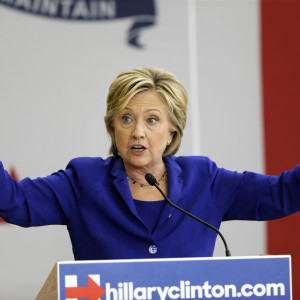Presidential frontrunners Hillary Clinton and Donald Trump are taking last week’s Islamic State-inspired mass shooting in California as an excuse not just to float policies aimed at online censorship and restricting Americans’ First Amendment rights, but a new avenue to demonstrate current and would-be high-level government officials’ fundamental misunderstanding of technology.
“We need to put the great disruptors at work at disrupting ISIS,” Clinton said at the Brookings Institution Sunday, the same day she told ABC’s George Stephanopoulos companies like Facebook and Twitter “cannot permit the recruitment and the actual direction of attacks or the celebration of violence by this sophisticated Internet user” — a reference to one San Bernardino shooter declaring allegiance to ISIS in a Facebook post proclaiming the attack.
RELATED: Obama Hedges on Encryption
“You’re going to hear all of the usual complaints, you know, freedom of speech, et cetera,” Clinton said at Brookings. “But if we truly are in a war against terrorism and we are truly looking for ways to shut off their funding, shut off the flow of foreign fighters, then we’ve got to shut off their means of communicating. It’s more complicated with some of what they do on encrypted apps, and I’m well aware of that, and that requires even more thinking about how to do it.”
Trump made similar comments Monday night at a campaign rally at the U.S.S. Yorktown in South Carolina.
“We’re losing a lot of people because of the Internet,” the Republican frontrunner said. “We have to do something. We have to go see Bill Gates and a lot of different people that really understand what’s happening. We have to talk to them, maybe in certain areas, closing that Internet up in some ways. Somebody will say, ‘Oh freedom of speech, freedom of speech.’ These are foolish people. We have a lot of foolish people.”
Beyond Trump’s laughable assumption that Bill Gates — who stepped down as Microsoft’s CEO in 2000 and chairman in 2014 — is capable of “closing that Internet up in some ways,” and both candidate’s flagrant dismissals of “freedom of speech, et cetera,” their terminology demonstrates a lack of comprehension, oversimplification, and policy proposals that, at best, advocate mixed messages.
The term “disruptors” in tech refers to innovators, technology or business models aimed at disrupting traditional economic sectors (think Uber and the taxi industry), and if posting on Facebook qualifies someone as a “sophisticated Internet user,” it’s likely your grandmother and most everyone else online qualifies.
Facebook removed San Bernardino shooter Tashfeen Malik’s post because it violated the company’s community standards, which “don’t allow people to praise acts of terror or promote terrorism,” according to a company spokeswoman — not because of a government mandate (yet). Twitter — the platform favored by ISIS radicalizers — quietly suspended 10,000 pro-ISIS accounts in the spring “for tweeting violent threats,” a representative later said.
While neither Clinton nor Trump, like almost every government official, have neglected to offer concrete solutions for government access to encrypted communications services — beyond getting law enforcement and the tech sector together “to figure out the best way forward” — suggesting third-party access at all ignores what experts have been saying for months: any backdoor between the sender and receiver adds to the complexity of encryption, and the likelihood of a vulnerability for criminals, bad actors or terrorists themselves to exploit.
Introducing backdoors will only drive extremists to use encryption products not sourced in the U.S., cryptologists argue. Even if the agencies eventually get access, it won’t help them identify suspects to surveil — something experts say was better accomplished by the NSA’s phone metadata program — a program Clinton endorsed ending via the U.S.A. Freedom Act.
While few would argue social media companies have an obligation to remove threats, bigoted comments or hate speech on their networks, proposing a broader form of blanket censorship beyond the content removal platforms already engage in seems to run counter to the goal touted by Clinton, Trump and others: tracking clearly identifiable suspects’ activity online — something encryption backdoors seemingly wouldn’t do.
That hasn’t stopped similar efforts from shaping up in Congress, where Senate Intelligence Committee ranking Democrat Sen. Dianne Feinstein is working to revive legislation, as early as this week, compelling Facebook, Twitter and others to alert federal agencies to terrorist activity on their networks.
On encryption, House Homeland Security Committee Chairman Michael McCaul on Monday announced he’ll be forming a commission to examine the encryption issue, with the greater goal of getting representatives from the industry and federal agencies to sit at the same table and work toward a solution.
McCaul added the commission would not force concessions on companies, but seek to address “security and technology challenges in the digital age.”
“A legislative knee-jerk reaction could weaken Internet protections and privacy for everyday Americans, while doing nothing puts American lives at risk and makes it easier for terrorists and criminals to escape justice,” the Texas Republican said at the National Defense University in Washington, D.C. “It is time for Congress to act because the White House has failed to bring all parties together — transparently — to find solutions.”

